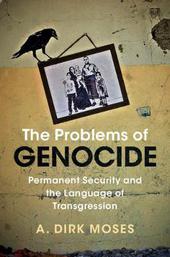
|
The Problems of Genocide: Permanent Security and the Language of Transgression
Hardback
Main Details
| Title |
The Problems of Genocide: Permanent Security and the Language of Transgression
|
| Authors and Contributors |
By (author) A. Dirk Moses
|
| Series | Human Rights in History |
|---|
| Physical Properties |
| Format:Hardback | | Pages:610 | | Dimensions(mm): Height 229,Width 152 |
|
| Category/Genre | World history
Genocide and ethnic cleansing
Military history |
|---|
| ISBN/Barcode |
9781107103580
|
| Classifications | Dewey:364.151 |
|---|
| Audience | | Tertiary Education (US: College) | | Professional & Vocational | |
|---|
|
Publishing Details |
| Publisher |
Cambridge University Press
|
| Imprint |
Cambridge University Press
|
| Publication Date |
4 February 2021 |
| Publication Country |
United Kingdom
|
Description
Genocide is not only a problem of mass death, but also of how, as a relatively new idea and law, it organizes and distorts thinking about civilian destruction. Taking the normative perspective of civilian immunity from military attack, A. Dirk Moses argues that the implicit hierarchy of international criminal law, atop which sits genocide as the 'crime of crimes', blinds us to other types of humanly caused civilian death, like bombing cities, and the 'collateral damage' of missile and drone strikes. Talk of genocide, then, can function ideologically to detract from systematic violence against civilians perpetrated by governments of all types. The Problems of Genocide contends that this violence is the consequence of 'permanent security' imperatives: the striving of states, and armed groups seeking to found states, to make themselves invulnerable to threats.
Author Biography
A. Dirk Moses is the Frank Porter Graham Distinguished Professor in Global Human Rights History at the University of North Carolina, Chapel Hill. He is the co-editor of Decolonization, Self-Determination, and the Rise of Global Human Rights Politics (2020) and The Holocaust in Greece (2018).
Reviews'This refreshingly original book turns the problem of genocide on its head. Contrariwise to international law and the dominant memory regimes, Moses points at the aspiration for permanent security as the crux of the matter. Passionate and historically sweeping.' Maria Malksoo, author of The Politics of Becoming European: A Study of Polish and Baltic Post-Cold War Security Imaginaries 'A pioneer of genocide studies, A. Dirk Moses has written a terrific, transgressive book destined to upend the field he has helped to define. Uncomfortable with morality tales, Moses is intent on smashing the hierarchy of international crimes established in the aftermath of World War II. A gut punch to conventional wisdom, this is critical global history at its best.' Jens Meierhenrich, author of Lawfare: A Genealogy (forthcoming) 'This brilliant, closely argued, and exhaustively referenced book makes a deeply persuasive case for replacing the prism of genocide with the crime of permanent security, calling out the multiple standards at play in the global order. A seminal paradigm-changer.' Nandini Sundar, author of The Burning Forest: India's War Against the Maoists 'Dirk Moses is the most original and provocative scholar writing on the problem of genocide. At its core deeply humanitarian, his book challenges every comfortable assumption of the meaning of genocide. This is essential reading for everyone concerned with human rights and mass atrocities.' Eric D. Weitz, author of A World Divided: The Global Struggle for Human Rights in the Age of Nation-States 'The Problems of Genocide can be strongly recommended to readers of this journal who have an interest in the macro-issues relating to criminal law and criminal justice, broadly conceived.' David O. Friedrichs, Rutgers 'Highly recommended.' A. Kolin, Choice Magazine '... The Problems of Genocide is possibly one of the most significant works on the intellectual history of genocide ever since the notion entered the realm of the history of ideas.' Dimitrios A. Kourtis, Journal of Conflict and Security Law 'Moses' study makes numerous contributions to various literatures and disciplines ... The author postulates a paradigm shift in genocide research, security studies and international law ... [His] book is necessary and admirable.' Norbert Finzsch, H-Soz-Kult
|